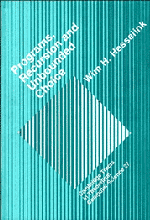Book contents
- Frontmatter
- Contents
- Preface
- List of symbols
- 0 Introduction
- 1 Weakest preconditions
- 2 Annotation, recursion and repetition
- 3 Healthiness laws
- 4 Semantics of recursion
- 5 Ramifications
- 6 Relational semantics
- 7 Determinacy and disjunctivity
- 8 Syntactic criteria
- 9 Operational semantics of recursion
- 10 Procedure substitutions
- 11 Induction and semantic equality
- 12 Induction and refinement
- 13 The strong preorder
- 14 Temporal operators
- 15 Predicative fairness
- 16 Solutions of exercises
- References
- Index of concepts and identifiers
8 - Syntactic criteria
Published online by Cambridge University Press: 11 March 2010
- Frontmatter
- Contents
- Preface
- List of symbols
- 0 Introduction
- 1 Weakest preconditions
- 2 Annotation, recursion and repetition
- 3 Healthiness laws
- 4 Semantics of recursion
- 5 Ramifications
- 6 Relational semantics
- 7 Determinacy and disjunctivity
- 8 Syntactic criteria
- 9 Operational semantics of recursion
- 10 Procedure substitutions
- 11 Induction and semantic equality
- 12 Induction and refinement
- 13 The strong preorder
- 14 Temporal operators
- 15 Predicative fairness
- 16 Solutions of exercises
- References
- Index of concepts and identifiers
Summary
In this chapter, we develop syntactic criteria on commands, which imply disjunctivity properties for their weakest preconditions. We suppose that the disjunctivity properties of the simple commands are known and try to generalize these properties to procedures and composite commands. From this chapter onward, the theory of Chapter 4 is indispensable.
In Section 8.1 we introduce, for a given set R of predicate transformers, a set of commands called the syntactic reflection Sy.R of R. The main property is that wp.q ∈ R for all q ∈ Sy.R. In Section 8.2 we provide methods to prove that a command belongs to the syntactic reflection.
In Section 8.3 the theory is specialized to the case that R is characterized by a disjunctivity property. Section 8.4 contains the next specialization, namely to the classes of total commands, of disjunctive commands, and of finitely nondeterminate commands. For our purposes the first two classes merely serve as examples or test cases. Our real aim is the class of the finitely nondeterminate commands. It is this class, or rather its syntactic reflection, that plays a key role in Chapters 11 and 13.
Syntactic reflection of semantic properties
Throughout this section we let R be a sup-closed subset of MT. We are interested in syntactic criteria on commands c ∈ A⊙ that imply wp.c ∈ R. Our solution consists of an algebraic definition of a subset Sy.R of A⊙ with wp.q ∈ R for all q ∈ Sy.R.
- Type
- Chapter
- Information
- Programs, Recursion and Unbounded Choice , pp. 116 - 129Publisher: Cambridge University PressPrint publication year: 1992



